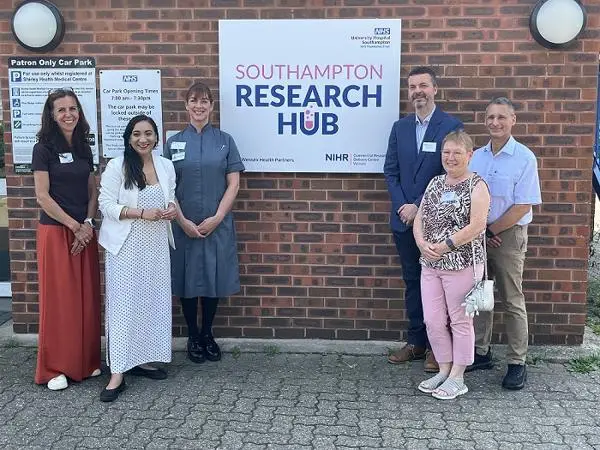Regional research centre marks official opening
A new commercial research centre has launched to increase access to cutting-edge treatments and clinical trials.
The launch event took place at the Southampton Research Hub in Shirley on Friday.
It is one of four hubs that form part of the new NIHR Wessex Commercial Research Delivery Centre (CRDC).
Working with regional partners, University Hospital Southampton (UHS) will host the multi-million pound research centre.
Ribbon cutting ceremony
Satvir Kaur, MP for Southampton Test, cut the ribbon to mark the official opening.
She said: "Southampton has always been at the forefront of cutting-edge innovation. I'm honoured to help launch this new Commercial Research Delivery Centre. It's great to see opportunities open up in the community for more people to take part in innovative research which will help to drive improvements in healthcare for all.
“We desperately need more people from all backgrounds to take part to ensure new treatments and interventions are relevant and safe for the whole population. I'd urge people to sign up to Be Part Of Research to find out more."
Satvir was joined by Southampton research participant Deborah Knight.
“I was thrilled to take part in this special ceremony,” Deborah said. “I’ve previously taken part in a study which was investigating a new flu vaccine, and I am keen to take part again.”
Deborah added: “We need all sorts of people, from all sorts of backgrounds, to put themselves forwards for clinical trials. This is the only way we can improve healthcare for everyone, helping save and improve lives.”

Improving research delivery
The new centre is part of a national network funded by the National Institute for Health and Care Research (NIHR). 20 CRDCs have been launched in response to findings that the UK has been falling behind other countries in commercial clinical trials activity.
There is also an urgent need to increase representation from all communities in commercial clinical trials.
The aim of the CRDCs is to enhance the speed and efficiency of commercial clinical research delivery.
They will work with industry and other research delivery infrastructure. This will support the UK’s status as one of the best places in the world for innovative companies to bring their research portfolios.
Wessex Hubs
The new Wessex-based CRDC builds on the success of four existing research hubs. They began as an emergency response to the COVID-19 pandemic.
Today, they operate in Portsmouth, Southampton, Bournemouth and Weymouth.
Since opening, people from across the region have benefitted from being able to take part in public health studies in their local area. This included the first ever late stage norovirus vaccine trial.
Dr Patrick Moore, a Poole-based GP and Director of the new NIHR Wessex CRDC, said: "Many participants in our trials are motivated by a strong desire to give back to the NHS and contribute to groundbreaking medical advancements that could improve the health and care of others in the future.
“With this expansion, even more people will have the opportunity to take part in vital research. It will drive meaningful improvements both regionally and beyond."
Prof Saul Faust, Co-Director of NIHR Wessex CRDC, added: "Becoming an official CRDC is a great milestone for Wessex Research Hubs. What makes this even more special is the opportunity to continue working as a collaborative team across the whole region.
“Being part of the new national network is an exciting development that will help us to offer taking part in clinical trials to many more people."
Ambitious goals
The new CRDC will further increase access to cutting-edge treatments and clinical trials for people in Hampshire, Dorset and the Isle of Wight. There will be a broad range of trials, providing opportunities for people with and without health conditions.
Importantly, new opportunities will also be created for people living further afield. This includes those living in Salisbury and Basingstoke.
A central objective is to help shift clinical trials beyond large hospital trusts into community settings. Use of two mobile research units will be expanded, and GP practices will receive more support to become research active. This will improve access in underserved areas by bringing trials even closer to people’s homes.
Dr Karen Underwood is the Director of Research & Development at UHS. She said: “Delivering research that impacts on our patients and communities is fundamental to our vision. I am proud that our Trust is supporting this regional initiative and look forward to working together with partners to deliver patient-centred and inclusive commercial research.”
Increasing the diversity of recruitment is another key goal of the CRDC. Working with patient and public involvement and engagement officers will strengthen links with local communities.
The CRDC will also provide access to a network of commercially active sites with gold-standard set-up times and performance. By building links with industry, it will lead to greater inward investment into the Wessex area and the UK as a whole.
Regional collaboration
Several local organisations will work together to deliver and support the new NIHR CRDC.
It will operate under the governance of Wessex Health Partners (WHP). This is a regional partnership. It is working to speed up improvements in health and care through research and innovation.
Christine McGrath, Managing Director of WHP, said: “When we came together as Wessex Health Partners during the pandemic, we created a trailblazing new model which elevated pan-regional working to a whole new level. Our new CRDC will build on this work further. It will show that by working together we can achieve so much more regionally, nationally and globally.”
The CRDC launch coincides with the official launch of the new Be Part of Research online registry. Almost 600,000 people have already signed up. The hope is to encourage many more.